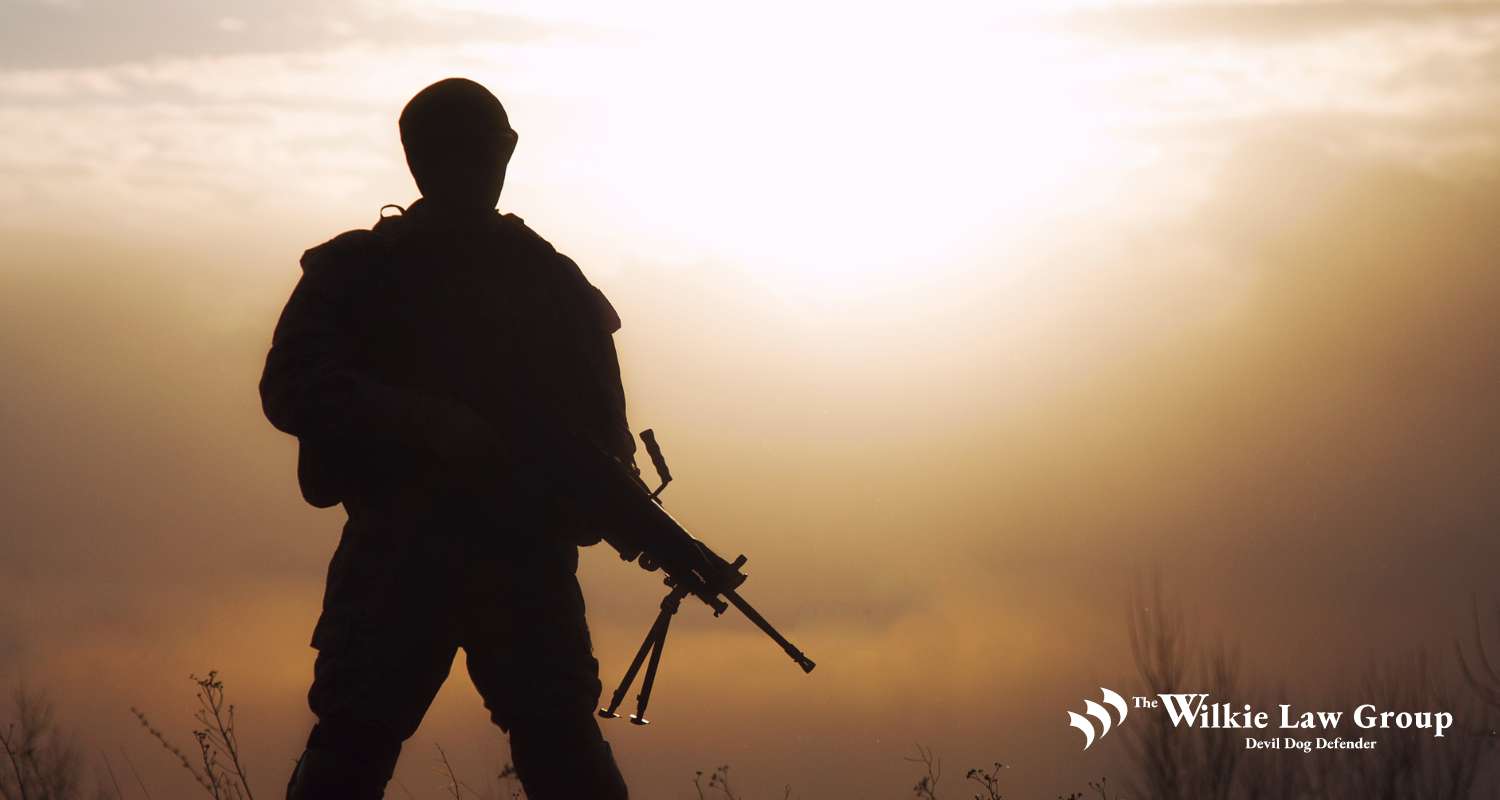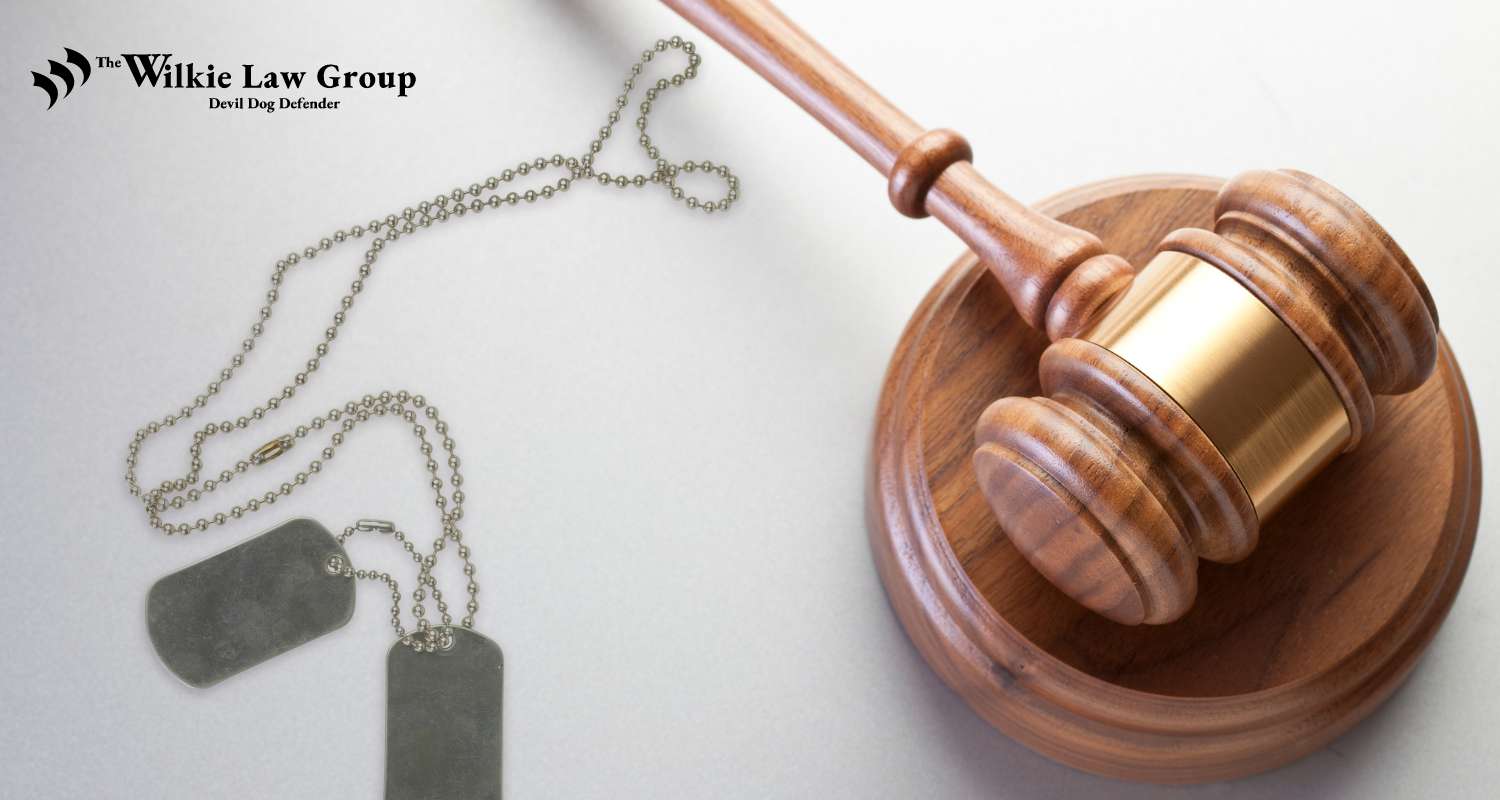Camp Lejeune Court Martial Lawyer
Aggressive Criminal Defense for Court Martial Hearings
Home » Camp Lejeune Court Martial Lawyer
Military Counsel
Helping Service Members Navigate The Military Criminal Justice System at Camp Lejeune
If you’re facing a court martial at Camp Lejeune, you need an experienced Camp Lejeune court martial lawyer to defend you against the accusations and help protect your military career and future from harm. Luckily, you can turn to a North Carolina military defense lawyer at The Wilkie Law Group for help with your court-martial case.

Facing a court-martial can be one of the most challenging moments in a service member’s career. The stakes are incredibly high, and your future within the Marine Corps and beyond may be on the line. At The Wilkie Law Group, we understand the unique pressures and challenges that military members face when accused of violating the law. As a former Marine himself, experienced court-martial lawyer Aden Wilkie brings both his military background and legal skill to every case. He and his team can help guide you through the military justice system and will provide you with the aggressive and strategic defense you need, protecting your rights every step of the way.
Call our law office at (910) 333-9626 or reach out online to schedule an initial consultation with a military defense attorney on our team today.
What is a Court Martial?
A court-martial is a military court that tries members of the armed forces for violations of the Uniform Code of Military Justice (UCMJ). This kind of disciplinary proceeding can result in significant consequences, including confinement, reduction in rank, or discharge from service.
Similar to civilian courts, court martials (more formally referred to as “courts-martial”) handle cases involving minor criminal offenses as well as more serious offenses. However, these types of military trials also cover offenses that may undermine military readiness or good order and discipline.
There are three main types of court-martials within the military justice system: Summary, Special, and General.
Summary Court Martial
A Summary Court Martial is the least severe type of military trial and is typically reserved for relatively minor offenses that are too serious for nonjudicial punishment but not serious enough for a Special or General Court-Martial. It involves a single officer who acts as the judge, jury, and prosecution in the case. These proceedings are less formal than other court-martial types, and the potential penalties are more limited, such as confinement for up to 30 days, reduction in rank, or forfeiture of 2/3 of pay for one month.
While a service member has fewer rights in this type of court martial compared to other types, it is often a quicker process. Additionally, service members can choose to refuse this process in favor of a Special or General Court Martial.
Special Court Martial
A Special Court Martial is a mid-level military trial for more serious offenses that wouldn’t fall under the category of either a summary or general court-martial. This type of court-martial involves a panel of at least three officers, a military judge, and possibly a defense counsel and prosecutor.
Although more formal than a Summary Court-Martial, the proceedings are still less severe than a General Court-Martial. A Special Court-Martial can result in penalties of up to one year of confinement, hard labor without confinement, reduction in rank, and forfeiture of two-thirds of pay for up to one year.
General Court Martial
A General Court Martial is the most serious level of military trial and is typically convened for offenses that carry the most severe punishments, including dishonorable discharge, lengthy imprisonment, and even the death penalty in extreme cases.
The court consists of a military judge and a panel of at least five officers, and the service member is entitled to legal representation from a JAG attorney or a private military defense lawyer. General Court Martial proceedings are conducted in a highly formal manner, similar to civilian felony trials, with significant procedural safeguards in place.

What is a Short Martial?
A “short martial” is an informal name for an expedited Special Court-Martial where specific cases can be solved more quickly. In this type of proceeding, a military judge will act as the judge, jury, and prosecution. The punishments can include up to six months in confinement, but cannot include bad conduct discharges. Also, service members cannot refuse this type of forum for their military trial.
Why a Service Member Might Be Subject to Court-Martial
A service member may be subject to court-martial if they are accused of violating various UCMJ articles under military law. For instance, some of the many different offenses that could lead to a court-martial include:
- Disobeying a commanding officer (UCMJ Article 90)
- Insubordination (UCMJ Article 91)
- Failure to obey a lawful order (UCMJ Article 92)
- Failure to report to duty and unauthorized absence (UCMJ Article 86)
- Conduct unbecoming of an officer (UCMJ Article 133)
- Desertion during wartime (UCMJ Article 85)
- Assault (UCMJ Article 128)
- Larceny and wrongful appropriation (UCMJ Article 121)
- Wrongful use of a controlled substance and other drug-related offenses (UCMJ Article 112a)
- Domestic violence (UCMJ Article 128b)
- Sexual assault (UCMJ Article 120)
- Murder (UCMJ Article 118)
The Camp Lejeune Court Martial Process
The court-martial process involves several phases, from investigations and hearings to trials and potential appeals. Each step of the criminal proceeding is governed by strict legal protocols, ensuring that the accused has the opportunity to defend against the charges with the support of their legal counsel.
Below are the various steps of the court-martial process a member of the Marine Corps may face at Camp Lejeune.
Conducting Investigations and Bringing Charges
Before a court-martial can take place, a thorough investigation is conducted to gather evidence and determine whether formal charges should be brought against the service member. This investigation is usually overseen by commanding officers and may involve interviews, document reviews, and the collection of physical evidence. If sufficient evidence is found, charges will be formally brought under the appropriate UCMJ articles.
Article 32 Hearings
An Article 32 hearing is a preliminary hearing similar to a civilian grand jury, where the military prosecutor presents evidence to determine if there is probable cause to proceed to a court-martial. The defense is allowed to cross-examine witnesses and present evidence, providing an early opportunity to challenge the charges.
These hearings play a critical role in shaping the course of the court-martial, which is why it’s important to have an experienced defense team on your side throughout the process.
Court Martial Trial
The court-martial trial itself is where the service member will face the charges in a formal setting. Similar to civilian trials, both the defense and prosecution are allowed to make opening statements, hear witness testimony, cross-examine witnesses, and make closing arguments.
Depending on the type of court-martial—Summary, Special, or General—the case may be heard by a military judge alone or by a panel of military officers. Additionally, the military member accused of the crime has the right to be represented by a free appointed military attorney (JAG) or a private civilian defense attorney throughout the trial.
Sentencing and Appeals
If the service member is found not guilty, then the service member is acquitted and can return to duty. If they are found guilty, however, the court-martial moves to the sentencing phase, where penalties are determined based on the severity of the offense. Penalties may range from fines and reduction in rank to imprisonment or discharge from the military.
After sentencing, the service member has the right to appeal the decision to a higher military court, which may review the case for legal errors or unfairness. A court-martial appeal lawyer can help determine whether or not the service member has grounds for an appeal and can aid them through the criminal appeals process.
In addition to filing an appeal, the person convicted can submit a request for clemency to the convening authority, asking for a reduction in sentence or dismissal of charges. They may also apply for the issuance of a pardon, which would forgive the offense and restore certain civil rights without expunging the conviction or overturning the court-martial findings.

Understanding Your Court Martial Rights
As a service member facing a court-martial, it’s essential to understand that you are entitled to certain basic legal rights. You have rights similar to those guaranteed to all U.S. citizens under the Constitution, as well as specific rights under the UCMJ.
Some of the many important rights that service members are entitled to include the legal right to:
- Be informed of the charges you’re facing;
- Be informed of your right to remain silent;
- Be informed of your rights against self-incrimination;
- Be informed of the purpose of the investigation;
- A fair and impartial trial;
- Cross-examine witnesses during your trial;
- Be represented by a free military attorney or a paid private attorney;
- Call upon witnesses during your trial if they meet certain criteria;
- Present evidence during your trial if it meets certain criteria; and
- Appeal your conviction to a higher military court, if found guilty.
Defense Strategies for Court-Martials
The defense strategies used in court-martials will always depend on the specific charges and circumstances of each case. However, they’ll often focus on challenging the validity of the evidence against the person accused of the offense or on challenging the procedures followed during the investigation.
Some common defense strategies that a civilian-military defense attorney may use in a court-martial include:
- Lack of intent or mens rea: Demonstrating that the accused did not have the required intent to commit the crime.
- Insufficient evidence: Challenging the prosecution’s evidence or witnesses as unreliable or lacking.
- Self-defense: Claiming the accused acted in defense of themselves or others.
- Duress or coercion: Showing the accused was forced or threatened into committing the offense.
- Mental health: Arguing the accused lacked mental capacity or was suffering from mental illness at the time of the offense.
- Unlawful command influence: Asserting that military command improperly influenced the case, which could affect the fairness of the trial.
- Procedural errors: Errors made during the trial or investigation could damage the integrity of the case and result in the charges being dismissed.
How an Experienced Military Defense Attorney Can Help
An experienced military defense lawyer can be a crucial asset if you’re facing a court-martial. They bring in-depth knowledge of military law and the UCMJ, as well as the specific rules and procedures that govern court-martial trials. This knowledge and experience allow them to navigate the military justice system efficiently, ensuring that your rights are protected at every stage of the process.
From conducting thorough investigations, gathering evidence, and preparing a strong defense to representing you during hearings and trials, an experienced military defense attorney like Aden Wilkie is fully equipped to challenge the prosecution’s case.
At The Wilkie Law Group, our attorneys’ experience in handling similar cases also allows them to foresee potential challenges and address them proactively, ultimately increasing your chances of a favorable outcome. With our support, you can be confident that your case will be handled with the care and diligence necessary to protect your future and military career.
Civilian Defense Lawyer vs. Military Defense Counsel (JAG)
When facing a court-martial, service members have the option to be represented by military defense counsel, also known as JAG (Judge Advocate General), or they can hire a private civilian defense attorney. While both options provide you with necessary legal representation, it’s almost always preferable to hire a civilian attorney with experience handling military criminal defense cases.
This is because JAG attorneys often have a high caseload, which may limit the amount of individual attention they can give to your case. Meanwhile, civilian defense lawyers who focus on defending military personnel offer more personalized service. These private attorneys often have extensive experience not only with military law but also with criminal defense in civilian courts, and since they typically handle fewer cases at once, civilian defense lawyers can dedicate more time and resources to building a robust defense strategy tailored specifically to your case.
If you have been accused of a serious crime in the military, the focused and dedicated attention provided by civilian defense lawyers can offer you a significant advantage in the courtroom.

Why Choose Aden Wilkie as Your Camp Lejeune Court Martial Lawyer?
If you’re facing a court-martial at Marine Corps Base Camp Lejeune, choose North Carolina criminal defense attorney Aden Wilkie to represent you in your case. When you do, you choose a highly experienced military lawyer who not only understands the intricacies of military law but also has firsthand knowledge of military life.
As a former Marine with over 22 years of service, Aden Wilkie knows the unique challenges service members face. He brings this personal experience into his legal practice, providing you with both empathetic and knowledgeable representation. This deep understanding allows him to communicate effectively with his clients, ensuring they feel supported throughout the court-martial process.
Located in Jacksonville, North Carolina, Attorney Wilkie and his team are well-versed in representing Marines and service members stationed at Camp Lejeune and Fort Bragg, as well as bases, camps, and stations across the country. He has a proven track record of successfully defending military clients in court-martial cases and a commitment to protecting your military career, rights, and future. His legal practice also extends to civilian court, providing him with a breadth of knowledge and experience in the field of criminal defense.
Trust the Experienced Military Defense Attorneys at The Wilkie Law Group for an Aggressive Camp Lejeune Court Martial Defense
At The Wilkie Law Group, we understand the consequences that court-martial punishments can have on your personal life and your military career. That’s why having an experienced military criminal defense attorney like Aden Wilkie is essential to ensuring a positive outcome in your case.
As a former member of the Marine Corps himself, Attorney Wilkie understands what’s at stake and is willing to do what it takes to protect your future in the Marine Corps and your permanent criminal record from harm. In addition to being a dedicated Camp Lejeune military defense lawyer, he also provides Fort Bragg court martial defense as well as experienced court-martial defense for every branch and at every military base across the nation.
Call the Devil Dog Defender Today!
If you’re facing criminal charges in the military, time is of the essence. Contact a Camp Lejeune court martial lawyer at The Wilkie Law Group today by calling (910) 333-9626 or reach out via our website to schedule a consultation with us regarding your case.
